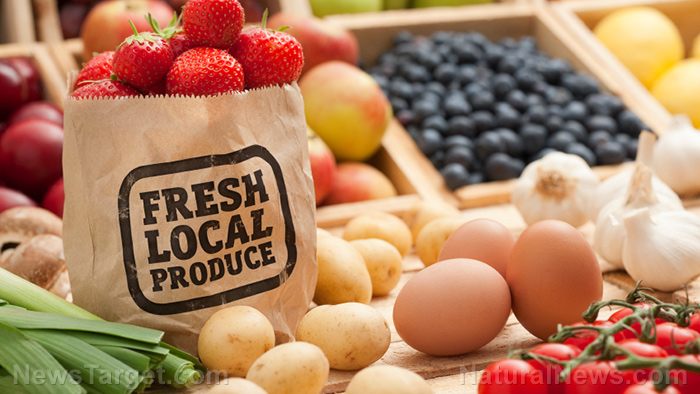
Organic Food – sources, health benefits, nutrients, uses and constituents at NaturalPedia.com
Tuesday, August 29, 2017 by Rhonda Johansson
http://www.naturalpedia.com/organic-food-sources-health-benefits-nutrients-uses-and-constituents-at-naturalpedia-com.html

The horror that are genetically modified organisms have forced us to take a closer look into what we eat. Most people tend to forget that one of the more crucial aspects of food is how they are manufactured. We place emphasis on the word “manufacture” because most products today show more likeness to items we build and use rather than things we should actually consume.
Eating organic food is not a lifestyle choice; it is integral to overall health. It has become all the more essential that we buy and source food that is grown using only proper guidelines. These should follow not only government mandates but should be verified by outside health regulatory groups as well.
Numerous studies are pointing to a “domino effect” eating organic food has. Those who take the first steps to eating better-quality food are more likely to follow healthier patterns as well, including engaging in regular physical exercise, drinking less (if at all), and practicing mind-body habits such as yoga and meditation.
List of known nutrients
Organic food is synonymous to excellent nutrition. The nutritional profile of foods that are grown organically is fantastic; displaying more nutrients and fewer nitrates. More than 400 published scientific reviews comparing non-organic food to their organic counterparts have proven that the latter holds more bioavailable phytonutrients. These, in turn, have the delicious effect of contributing to supreme health.
As an example, organically-grown oranges, while smaller than their supermarket cousins, hold 30 percent more vitamin C. Other organically-grown produce, such as lettuce, spinach, carrots, potatoes, and cabbage can contain as much as 27 percent more vitamin C, 21.1 percent more iron, 29.3 percent more magnesium, 13.6 percent more phosphorus, and 18 percent more polyphenols than their conventional siblings.
Medicinal uses of organic food
To fully appreciate the way organic food can be used as a preventive medicine, let us first begin by defining the item. Having an organic label means that the food is free of synthetic inputs like pesticides and has not been genetically modified or tampered with in any way. It is, in essence, the way nature intended the fruit, vegetable, herb, nut, or what have you, to be.
Regularly and consistently eating organic food promotes and enhances overall health. Cohort studies have shown that organic food can reduce the occurrence of various conditions including type-2 diabetes, cardiovascular illness, dementia, and adolescent allergies. There is also evidence which concludes that organic food reduces a person’s vulnerability to the heavy metal cadmium, which is found in artificial fertilizers.
Those who eat organic food are also less likely to be obese, thus avoiding weight-related diseases.
Choosing organic produce will also lessen your exposure to environmental pesticides. Science has shown time and again that repeated pesticide exposure can lead to deficiencies in neurodevelopment.
Body systems supported by organic food
All body systems are supported by organic food. Consumption of organically-grown products guarantees proper organ function and improved blood flow.
Ways to use organic food
Picture seeing the world with rose-colored glasses. It can happen in a place where the light is pink, and when your health is peachy keen. There are so many ways to use organic food; you are truly limited by your imagination. From bean soup to the more esoteric hummus, here are a few recipes you can try.
Where to learn more
- Organic food vastly more nutritious than genetically modified food: huge new science study reveals the differences
- Organic food – who can we trust
- The Organic Food Bar packs a nutritional punch in portable form
- Local and organic food, farming: Here’s the gold standard
- Organic food contains up to 60 percent more antioxidants: study
Summary
Organic food holds more nutrients than their non-organic counterparts. As such, they are better able to support overall health.
Sources include:
Tagged Under: Tags: organic food






